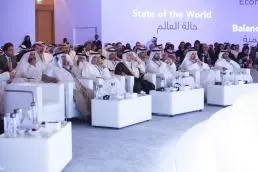PHOTO
Fayyad: drop in oil prices will raise investors interest in non-oil sectors
Mohieldin: the implementation of taxes will increase investments
Dubai-UAE: 15 December, 2015
Arab countries need to take greater control of their currency exchange rates as part of a broad range of economic reforms, including the introduction of new taxes that are aimed at driving economic diversification, according to Salam Fayyad, former Prime Minister of Palestine and eminent economist. Fayyad was addressing the eighth edition of the Arab Strategy Forum that convened in Dubai today.
Participating in a discussion on 'The State of the Arab World Economy in 2016', along with Mahmoud Mohieldin, World Bank Corporate Secretary, Fayyad described Arab currency exchange rate stability as an illusion, r.
Fayyad said: "It is very important that we talk freely about this issue, without restrictions. We should examine this issue in a quiet and considered way. No one can force us to change but when we talk about the Arab world and the countries making up this region, we need to focus on letting go of currency stability. This will significantly benefit the economic diversification the region is striving to achieve today."
Looking ahead to 2016 and beyond, the forum identified key factors that could influence the Arab world economies in 2016 and beyond:
1. Continued weakness in oil prices
2. Introduction of value added taxes (VAT) and other taxes such as the corporate tax
Continued weakness in oil prices
Oil prices are likely to decline further in 2016, impacting the revenues of oil exporting countries. Stressing that the Arab world cannot be classified as one holistic market, Moheildin said that non-oil-exporting countries are yet to see any benefits from the drop in oil prices. He added that lowering of oil prices could however prove beneficial to oil exporting nations by incentivizing governments to accelerate the pace of economic reform and diversification to mitigate their impact.
The introduction of VAT and other taxes, including corporate taxes
Describing the present 1970s tax structure in the Arab world as outdated, Fayyad said there is an urgent requirement for tax reform, especially in the GCC countries. In addition to the much talked about introduction of VAT, Fayyad said governments should consider a range of new taxes, including corporate and real estate taxes. The implementation of a range of taxes would not only contribute to economic diversification, but also bring in the much-needed economic stability and investor confidence in the region.
The discussions concluded on a hopeful note that 2016 could be the year that witnesses an end to conflict in the Middle East, heralding a period of reconstruction.
"Post war governments will need huge support. We need to focus on quick actions which can be implemented in months and not cost billions of dollars in order to lay solid foundations for political, social and economic stability in the region," Fayyad summed up.
-Ends-
© Press Release 2015




















